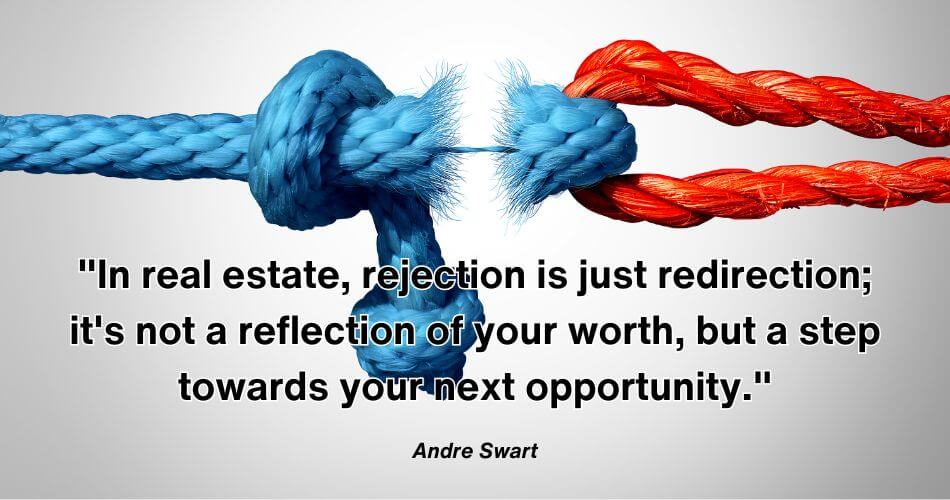Mastering Real Estate Rejection: Turning Setbacks into Success
Learn how to handle rejection like a pro and turn it into your greatest strength!

In the fast-paced world of real estate, rejection is part of the game. It’s a tough industry, and many give up within the first year.
But those who master the art of bouncing back from setbacks not only survive but thrive, building successful, lucrative careers. Andre Swart, a seasoned property mogul in the Western Cape, knows this all too well.
Having faced some rejections throughout his career, he has learned that handling rejection effectively is key to long-term success.
In this article, we’ll explore some effective techniques for managing rejection in real estate, helping both experienced agents and newcomers boost their confidence and resilience.
It’s Not Personal: Detaching from Rejection

One of the most crucial lessons in real estate is learning to detach emotionally from rejection. When a client chooses another agent or a deal falls through,
it’s essential to remember that it’s not personal. Rejection is often about the client’s needs and circumstances, not a reflection of your abilities or worth.
Expecting Rejection
Rejection is a natural part of the process. Expecting it and not letting it discourage you is vital. Instead of seeing rejection as a failure, view it as an opportunity to learn and improve.
Every “no” brings you closer to a “yes.” Top estate agents often recall numerous instances where clients they assumed were close to them chose another agent.
It hurt, but by wishing them well and maintaining a positive relationship, he secured their business in later transactions. Remember, your response to rejection can influence future opportunities.
Shifting Your Mindset: Reframing Rejection

To thrive in real estate, you need to shift your mindset. View rejection as a step in the sales process rather than a personal failure. Not every client will be a perfect fit, and that’s okay.
By reframing rejection, you can focus on finding clients who truly resonate with your services.
Enhancing Your Skills
Competence breeds confidence. Mastering the art of communicating with homeowners is where your investment truly pays off. Role-play conversations with friends or family to practice your sales pitch and build confidence.
This preparation helps you feel more comfortable and prepared when interacting with potential clients.
Focusing on Your “Why”
Remind yourself why you’re in real estate. What motivates you? What are your goals? Reconnecting with your purpose can help you stay resilient in the face of rejection. Every setback is a stepping stone towards your ultimate success.
Building Resilience: Learning from Rejections
Rejection can be a powerful teacher. Each rejection offers an opportunity for growth and learning, leading to the refinement of future offers and strategies.
Be Persistent
Persistence is key in real estate. Continue your outreach, refine your approaches, and follow up with improved offers. Persistence often pays off in the long run.
Andre emphasizes the importance of staying positive and persistent, as every rejection brings you closer to finding a motivated seller.
Building Rapport

Establishing a connection with sellers through genuine interest and empathy can increase the acceptance of offers. By understanding the seller’s needs and concerns, you can tailor your approach to better align with their expectations.
Offering Multiple Options
Providing choices gives sellers a sense of control and increases the chances of finding common ground. Offering multiple options demonstrates flexibility and a willingness to work towards a mutually beneficial solution.
Leveraging Your Network
Opportunities from within your network are less likely to result in rejection and may provide valuable insights. By nurturing your professional relationships, you can tap into a wealth of resources and support.
Seeking Professional Guidance
Mentors or coaches can offer strategies to enhance your success rates and improve rejection-handling skills. Top agents credit much of their success to the guidance they received from experienced mentors in the industry.
Real Estate Rejection: Knowing When to Walk Away
Rejection is a common experience in real estate, both for buyers and sellers. Knowing when to walk away from a deal can be challenging but is crucial for protecting your interests.
Financial Considerations
If the price or terms of the deal are not favorable, it’s wise to walk away. Consider your budget, market conditions, and potential risks before proceeding with a deal that doesn’t meet your criteria.
Emotional Factors
Don’t let emotions cloud your judgment. If you feel pressured or uncomfortable with any aspect of the deal, it’s best to step back and reassess. Trust your instincts and prioritize your well-being.
Legal Concerns
Ensure all legal aspects of the deal are in order, including contracts and disclosures. If anything seems unclear or suspicious, seek professional advice before proceeding.
Recognizing Signs of a Bad Deal
Watch out for red flags like unreasonable demands, hidden costs, or lack of transparency from the other party. Recognizing these signs early can save you from future complications and losses.
The Benefits and Value of Managing Rejection

Successfully managing rejection in real estate leads to increased resilience, improved negotiation skills, enhanced networking opportunities, and ultimately higher chances of closing deals.
By following the recommended solutions, agents can turn rejection into opportunities for growth, learning, and increased success in the industry.
Handling rejection effectively is a vital skill for any real estate agent. By reframing your perspective, enhancing your skills, building resilience, and knowing when to walk away, you can turn setbacks into opportunities for success.
As Andre has shown through his career, rejection is not the end but a stepping stone to greater achievements. How have you turned rejection into success in your real estate journey?
